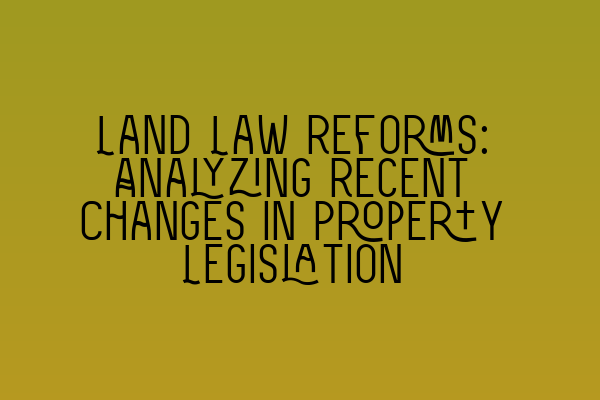Land Law Reforms: Analyzing Recent Changes in Property Legislation
Land law is a crucial aspect of property legislation that governs the rights, obligations, and interests in land and real estate property. It plays a vital role in ensuring the smooth and fair transaction of properties, protecting the rights of both buyers and sellers, and maintaining the overall stability of the property market. As the legal landscape continuously evolves, it is essential to stay updated with recent changes in land law to navigate the complex realm of property transactions effectively.
In this article, we will analyze the recent land law reforms that have significantly influenced property legislation. We will discuss how these changes impact property transactions, the rights and responsibilities of parties involved, and the importance of seeking professional legal advice in property matters.
1. The Role of Land Registry:
The Land Registry plays a crucial role in land law reforms by providing secure and reliable records of land and property ownership. It ensures transparency in property transactions, protects against fraud, and enables easy access to crucial information regarding land and property. Recent reforms have focused on digitizing the land registry system to streamline property transactions, expedite the registration process, and enhance accessibility for all parties involved.
For a comprehensive understanding of the land registry system, it is vital to have a basic knowledge of contract law. You can test your knowledge by taking interactive SQE mock tests for contract law.
2. Landlord and Tenant Reforms:
Landlord and tenant law is a critical area within land law, governing the relationship between property owners and tenants. Recent reforms in this area have focused on protecting the rights and interests of tenants, improving security of tenure, and regulating rental agreements. These reforms aim to strike a fair balance between the rights and responsibilities of both landlords and tenants, ensuring a healthy and stable rental market.
If you wish to delve deeper into the reforms related to landlord and tenant law, you may find our article on contract law reforms helpful. It provides a comprehensive analysis of recent changes in contract law, including common issues faced by landlords and tenants.
3. Environmental Considerations:
The importance of environmental considerations in land law cannot be overstated. Recent reforms have recognized the need for sustainable development, conservation of natural resources, and protection of the environment in property transactions. These reforms place an increased emphasis on conducting thorough environmental due diligence, complying with regulations related to pollution control, and preserving ecological balance during the transfer of land rights.
Understanding the rights and responsibilities of parties involved in a contract is essential. Our article on parties in a contract: rights and responsibilities provides a comprehensive guide to help you navigate through the complex dynamics of contractual relationships.
4. Equitable Interests and Trusts:
Equitable interests and trusts in land law have witnessed significant reforms to ensure fairness and protect the rights of beneficiaries. Recent changes have focused on clarifying the legal principles governing trusts, enhancing the rights of beneficiaries, and providing a more robust framework for resolving disputes related to equitable interests.
It is essential to understand the ethical implications in contract law. Check out our comprehensive guide on the importance of ethics in contract law to gain insight into the ethical considerations that underpin the legal landscape.
5. Leasehold Reforms:
Leasehold reforms have been a subject of substantial discussion and change in recent times. The reforms seek to address issues related to excessive ground rents, onerous leasehold terms, and empower leaseholders with additional rights and protections. These reforms aim to rectify the imbalances in the leasehold system and provide a fair deal for leasehold property owners.
To gain a deeper understanding of the complexities surrounding contracts and contractual issues, it is important to grasp the concept of duress and undue influence. Our article on unveiling duress and undue influence in contracts offers an in-depth analysis of these critical legal concepts.
Conclusion:
Land law reforms have transformed the property legal landscape, aiming to establish fairness, transparency, and stability in property transactions. It is essential for property owners, buyers, and other parties involved in property transactions to stay updated with these reforms to ensure compliance with the law and protect their rights.
At SQE Property Law & Land Law, our team of expert solicitors understands the intricate nuances of property legislation and stays up-to-date with the latest reforms. If you require professional legal advice or assistance with property matters, please do not hesitate to contact us.
